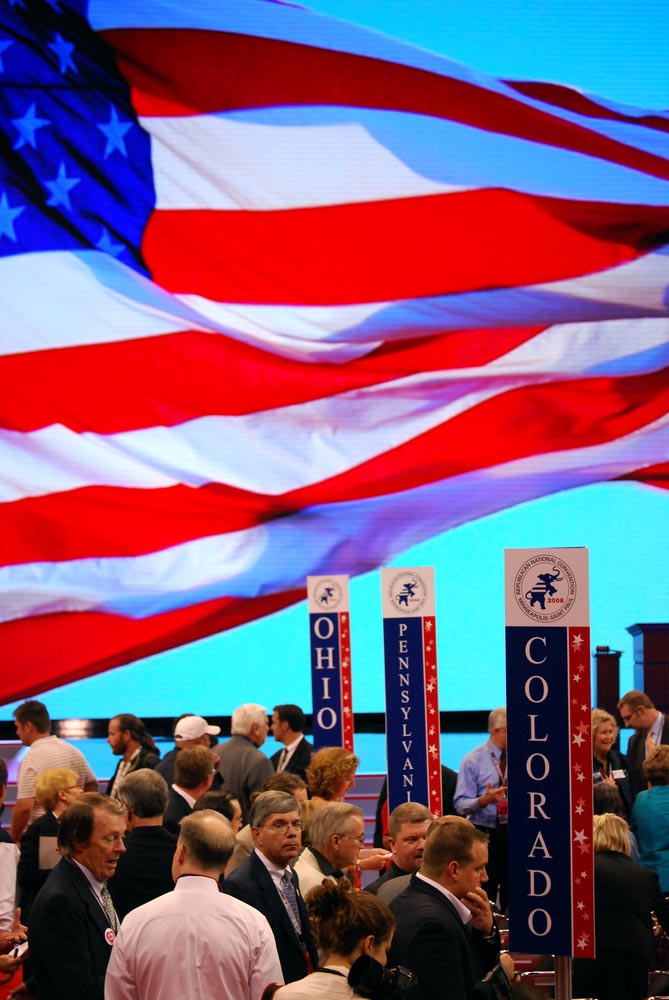March 9, 2016
Stanford expert says brokered Republican convention could be 'gigantic mess,' but not a bad idea
Stanford political scientist Morris Fiorina says the current party nominee process system puts a premium on campaign skills and fund-raising, not a demonstrated capacity to govern. A brokered convention would give the party a chance to consider alternative candidates.
By Clifton B. Parker

Delegates to the 2016 Republican convention could find their roles are very different from these delegates to the 2008 convention in St. Paul, when John McCain had a clear path to the nomination. (Frontpage / Shutterstock)
While a brokered party convention might seem problematic, it could result in a candidate better able to govern rather than one simply adept at political campaigning, a Stanford expert said.
Primary season is accelerating, and many say the Republican establishment does not want Donald Trump to win the party’s nomination. Trump currently has 458 delegates compared with 359 for Texas Sen. Ted Cruz, his closest rival. A candidate needs 1,237 delegates to avoid a contested convention.
The Stanford News Service spoke with Stanford political science Professor Morris Fiorina about what a brokered political party convention might look like. Fiorina is also a senior fellow at the Hoover Institution and the Wendt Family Professor of Political Science at Stanford. Here are excerpts from the interview.
What is a brokered convention?
There is some terminological confusion about this subject. When people use terms like “open” or “brokered” conventions, they usually have in mind a convention where no candidate wins on the first ballot, thus opening up the process as delegates are released from their commitments. In this sense, the last brokered convention was on the Republican side in 1948. Prior to 1972 (the beginning of the modern primary process), one couldn’t win a majority of delegates in primaries and caucuses. In 1968, Hubert Humphrey didn’t enter a single primary but the bosses who controlled delegates were behind him, so his nomination was never in question. In 1976, neither Gerald Ford nor Ronald Reagan had won a majority of delegates, but there were more uncommitted delegates in those days and Ford corralled enough to win on the first ballot.
If no candidate wins a majority of the delegates chosen in caucuses and primaries (plus votes from super-delegates), it falls to the national convention to choose a nominee.
What is the procedure for picking a nominee at such a convention?
The Republican National Committee undoubtedly has people working on exactly that question right now. The last contested convention was in 1948 so they won’t find much useful in the archives, given how different conditions are now. Back then there were “brokers,” a term given to governors, mayors and other party bosses who controlled blocs of delegates. These brokers could retire to the “smoke-filled rooms” and make deals. Today, there is no one who controls large blocs of delegates. An open convention would likely be chaotic. When we figure in mundane details like the availability of thousands of hotel rooms, airline reservations, and more, the party could be looking at a gigantic mess.
Do you think a delegate split will happen this year in the Republican race?
After Trump’s wins in Michigan and Mississippi on March 8 and some big winner-take-all primaries coming up shortly, that prospect is becoming less likely.
Is there a better way to allocate delegates for the political parties and avoid brokered conventions?
Why assume that we want to avoid brokered conventions? There’s a lot of research that points to the low turnout in primaries and especially caucuses, and the frequently unrepresentative nature of the people who do turn out. If no candidate emerges as clearly dominant, it might be better for the delegates to look at others who were not in the field. The current system puts a premium on campaign skills and fund-raising, not on a demonstrated capacity to govern. Maybe the latter would figure more prominently if the convention were to decide. That might be wishful thinking, of course.
What would be the impact of a brokered convention on that party’s nominee in the general election?
It depends, so consider two scenarios:
One candidate – let’s just say Trump – is very near a majority and no one else is very close. If the convention denies him the nomination, some of his supporters might not vote or vote for a Democrat, or conceivably he could run as a third party candidate despite his earlier pledge. Of course, these are potential problems even when there is a clear majority winner at the convention.
Republican officials were worried that Ron Paul might run on the Libertarian ticket in 2012. Many supporters of Sen. Eugene McCarthy were angry when the Democratic nomination went to Hubert Humphrey in 1968, and some polls suggested that 40 percent of those who supported Sen. Gary Hart in the 1984 Democratic primary contests defected to Ronald Reagan in the general election. But all things considered, under this scenario the Republican Party is badly split.
The second scenario is that Trump fizzles and no candidate is close to a majority at the convention. In that event the Republican Party may be better off turning to a non-candidate who has not antagonized any of the factions supporting the declared candidates. It might be the only way to paper over the party splits and present a united front for the election. This is the best case scenario for Republicans – but it looks increasingly unlikely.
For more Stanford experts on political science and other topics, visit Stanford Experts.
-30-
|